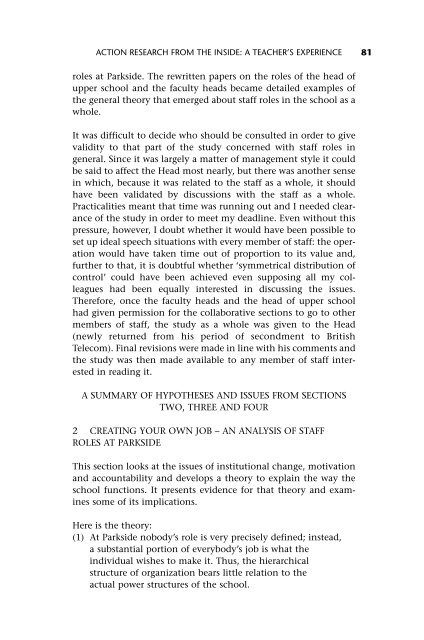Action Research A Methodology for Change and Development
Action Research A Methodology for Change and Development
Action Research A Methodology for Change and Development
Create successful ePaper yourself
Turn your PDF publications into a flip-book with our unique Google optimized e-Paper software.
ACTION RESEARCH FROM THE INSIDE: A TEACHER’S EXPERIENCE 81<br />
roles at Parkside. The rewritten papers on the roles of the head of<br />
upper school <strong>and</strong> the faculty heads became detailed examples of<br />
the general theory that emerged about staff roles in the school as a<br />
whole.<br />
It was difficult to decide who should be consulted in order to give<br />
validity to that part of the study concerned with staff roles in<br />
general. Since it was largely a matter of management style it could<br />
be said to affect the Head most nearly, but there was another sense<br />
in which, because it was related to the staff as a whole, it should<br />
have been validated by discussions with the staff as a whole.<br />
Practicalities meant that time was running out <strong>and</strong> I needed clearance<br />
of the study in order to meet my deadline. Even without this<br />
pressure, however, I doubt whether it would have been possible to<br />
set up ideal speech situations with every member of staff: the operation<br />
would have taken time out of proportion to its value <strong>and</strong>,<br />
further to that, it is doubtful whether ‘symmetrical distribution of<br />
control’ could have been achieved even supposing all my colleagues<br />
had been equally interested in discussing the issues.<br />
There<strong>for</strong>e, once the faculty heads <strong>and</strong> the head of upper school<br />
had given permission <strong>for</strong> the collaborative sections to go to other<br />
members of staff, the study as a whole was given to the Head<br />
(newly returned from his period of secondment to British<br />
Telecom). Final revisions were made in line with his comments <strong>and</strong><br />
the study was then made available to any member of staff interested<br />
in reading it.<br />
A SUMMARY OF HYPOTHESES AND ISSUES FROM SECTIONS<br />
TWO, THREE AND FOUR<br />
2 CREATING YOUR OWN JOB – AN ANALYSIS OF STAFF<br />
ROLES AT PARKSIDE<br />
This section looks at the issues of institutional change, motivation<br />
<strong>and</strong> accountability <strong>and</strong> develops a theory to explain the way the<br />
school functions. It presents evidence <strong>for</strong> that theory <strong>and</strong> examines<br />
some of its implications.<br />
Here is the theory:<br />
(1) At Parkside nobody’s role is very precisely defined; instead,<br />
a substantial portion of everybody’s job is what the<br />
individual wishes to make it. Thus, the hierarchical<br />
structure of organization bears little relation to the<br />
actual power structures of the school.

















